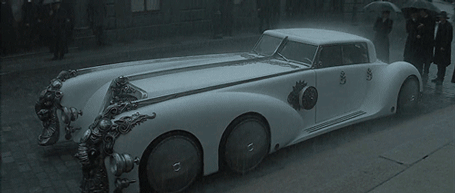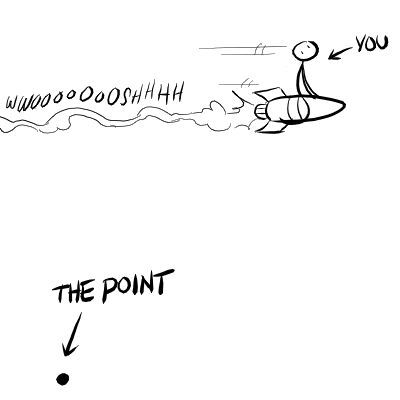GORDON: A long time ago, in a galaxy far away, it was suggested that Evan and I discuss fan fiction and its merits (or lack thereof).
Now I’m going to jump right into things by saying that not only do I not believe fan fiction is good, I do not feel it has the capacity to ever be so.
EVAN: Okay. Why?
GORDON: First and foremost, I feel that fan fiction tends to be, quite simply “bad.” I’m talking bad in a technical sense. People who write fan fiction typically aren’t writers, and in my experience, fan fiction is just poorly constructed. At the very best, a poor imitation of the original creators’ style.
Which brings me to my second point: I don’t think it’s right to try to imitate a creators’ style. I think trying to do so is inevitably going to produce second-rate work which detracts from the greater mythos, rather than contributing to it.

EVAN: To ask a question before my proper response, have you ever read any fan fiction?
GORDON: I have. I’ve read stuff like some of the Star Wars novels, some Halo novels, some alternate imaginings or expansions on literature like Jane Eyre and so on.
EVAN: To address your first point, I have read a great deal of very, very good fan fiction. Back in my earlier years I scoured the internet for a lot of WarCraft III stories, and “Odd Bedfellows” by Sumiyoshi was an incredible read. The site that hosted it has since gone through a pretty extensive change, and as far as I can tell it can’t be found anywhere on the internet. Other WarCraft stories by SickleYield, on FanFiction.net, are very, very good as well.
As to your second, I find that most of the fan fiction writers I’ve encountered are rarely ever trying to copy a particular style, which makes sense seeing as how it would be hard to pin down the writing style of a video game.
To follow up with that, I have seen plenty of stories add to a story’s mythos. On yet another WarCraft related note, there was such a hubbub made about creating a female racial leader for the Goblins in World of WarCraft [which included a lot of extensive writing on her fictional background] that Blizzard put her in the game as an NPC [she has as of yet been promoted to leader, though].
GORDON: I’d counter by asserting that these examples you’ve provided are, well, fan fiction in the loosest sense of the word. We’re talking less about a story or characters, and more about a loosely constructed bunch of worlds here. Video games, especially an MMO like Warcraft, while indeed having a history, are still pretty loosely stitched together. They have to be, to allow the players to fill out the fantasy of playing a character in ’em .
EVAN: The examples I’ve mentioned are the exact definition of fan fiction. It can be a story about characters from Supernatural or a hero from the Marvel universe or the teacup from Beauty and the Beast, every one would be considered fan fiction; it doesn’t matter what form of media you’re drawing from.
On that note, you mentioned Star Wars novels as being fan fiction, and they aren’t. The term “fan fiction” denotes that fans are the ones doing the writing, and not professionals paid by the company that owns said characters, worlds, et cetera.
GORDON: The things they write about those poor characters from Supernatural…

But jumping back to the issue at hand, I’d again assert that more often than not, fan fiction tends to be an attempt to capture the sense of amazement or wonder or horror or whatever that the original story has.
I’d assert further that fan fiction falls short because it fails to recognize what actually makes those stories good in the first place, and simply attempts to (clumsily) transport characters or settings into a new piece.
It’s like this: I like a hamburger, so I get all the ingredients and put them on a table. It’s simply not the same thing. The whole is more than the sum of its parts.
EVAN: The thing is that you’re not entirely accurate when you say what fan fiction “tends to be.” Honestly, a lot of it is, well, porn. Quite a bit of the Harry Potter is slash, which for those of you who don’t know is pairing up couples of the same gender, typically not homosexuals within the source material itself.
Fan fiction is really whatever the author wants it to be. They may be trying to capture what they first felt when accessing whatever it was they were writing about, but they might also just feel like creating smut.
As to your second point, you’re overgeneralizing a huge amount by saying that “fan fiction” falls short. In many ways, it is its own genre, and some writers will do better than others. There are really, really awful science fiction authors, but that doesn’t mean that as a whole science fiction is not great.
It is obvious that there is a fair amount of fan fiction that is complete and utter dreck, but I personally try to steer clear of generalizations. Some people might be clumsily rubbing raw ground beef and lettuce together, but still others are grilling it first, getting the condiments ready, etc.
GORDON: Well, I have in fact read some of the fan fiction you have stated was enjoyable. I recall reading a StarCraft story, and a Superman one, and one other whose original subject matter slips my memory.
I didn’t care for them at all. They weren’t the worst things I’ve read by any means, but certainly not something I believe should have been brought out into the light of day. I think the issue with even “good” fan fiction is this: it’s not a story, it’s an homage.
A story- a decent story- is universal. Whether you’re reading the Arabian Nights or Dracula or Tom Sawyer, there are elements- core elements- which you can relate to.
This isn’t the case with fan fiction, where the central point ISN’T to communicate the author’s message but to point at some existing work going “Hey, remember that thing? Remember how cool that was?”
EVAN: I feel like that’s a gross simplification. And an assumption that by writing characters that do not personally belong to me, I am simply referencing them for the sake of referencing them. I don’t think it’s unbelievable to think that I could write about, say, Sherlock Holmes and come up with a compelling narrative of my own.

It’s what Alan Moore did with The League of Extraordinary Gentlemen, and it’s what J. J. Abrams is doing with Star Trek and what Michael Bay did with Transformers. Really the only difference is whether or not what’s being written is sanctioned by its creative owners.
GORDON: I HAVE read a bit of League O’ Extraordinary Gentlemen, and while it’s fun, in no way would I say that his Captain Nemo is anything like that of Jules Verne’s iconic story. I was in fact thinking about Moore’s use of this very book when preparing for today’s topic.

Though admittedly, most of that time was spent fantasizing about this car…
And ultimately my conclusion was that Moore was making his own piece. The League of Extraordinary Gentlemen works because it’s a fundamentally good story, not because it’s latching onto these Victorian stories.
And if you DID write a Sherlock Holmes story, I’d like to think I’d immediately be able to tell it apart from the Sherlock Holmes of Arthur Conan Doyle. While you’re a good writer, I don’t think you could capture all the perfections (and indeed, imperfections) that make that authors work connect with us the way it does.
EVAN: You’re completely missing the point here.

By writing about Sherlock Holmes I am not necessarily going out of my way to emulate the author and mimic his writing style and pen a story or novel or whatever that stands up to what which Doyle originally created.
All I’m doing is writing a story with the character.
That can be well-written or poorly written. It can be a huge homage to everything that Doyle did in his detective stories, or it can be very much its own thing. It can attempt to connect with people the way the original work did, but I will say again that for many this is not their intent. Their intent is just to write a story; lofty aspirations don’t always come into it.
GORDON: So let’s do the math here. How much of the fan fiction genre would we say is comprised of porn?
EVAN: I don’t think either of us are qualified enough to assess that.
GORDON: But if we had to estimate.
EVAN: I don’t think I can hazard a safe guess. There is an unbelievable amount of fan fiction out there, with thousand more words being written as we have this talk.
GORDON: 40-50%? Just considering the amount of smut churned out?
EVAN: Like I said, it’s hard to comment. I suppose if you take tumblr into account maybe as low as 30%? But neither of us are on tumblr, or deviantART, or FanFiction.net, so honestly we don’t know.
GORDON: Okay, let’s say 30%. We’re going to discount that, and focus on the other 70%. Of that percentage, how much would we estimate is technically well written?
EVAN: I know where you’re going with this, so I’m going to put a hold on it for a second.
I still liken fan fiction to a genre, and when you look at the amount of fantasy out there, how much is actually good? You walk into a bookstore and look at their fantasy selection, and how many of these are actually decent novels?
In every case you are going to find both good and bad, and the extremes of each. There is really horrible published work; there is likewise some amazing unpublished writing out there.
Your assessment at the very beginning was that fan fiction is never good, and does not “have the capacity to ever be so.” I just don’t think that’s true.
GORDON: There are going to be exceptions to most any rule, I will admit, however, I believe that when you crunch the numbers you’ll find that even compared to high fantasy, which produces cringingly bad work like there’s no tomorrow, fan fiction doesn’t even rival that.
Assuming one out of every two fan fictions pieces is technically well written (and that’s being generous), and one in two of THOSE works is actually compelling, we’re left with a pretty pitiful percentage. In sum total I’d put good fan fiction at a generous 15%. What am I to make of a genre that produces roughly one good piece for every nine bad ones?
EVAN: You’re to treat it like any other genre.
Apatow-esque comedies are incredibly stupid and rarely have any merit whatsoever. The vast majority are not very good, yet last I checked we both think Superbad is decent stuff.

What you do is you acknowledge that there is an exception to every rule, and that generalizing is never a fair option. It applies to people just as much as it applies to genres, different types of media, etc.
The blanket statement that something does not have the capacity to ever be good is something that everyone should avoid.
GORDON: Okay, I’ll cede you that one.
And with that, ladies and gentlemen, we are officially out of time. Be sure to comment below with a topic for us to discuss next week.
EVAN: In an unprecedented turn of events, Gordon has suggested that we do a poll for you to vote who you agree with more; there is also the option that we are both dead wrong.
Remember to comment on whatever you want us to talk about! Thanks for tuning in, and see you next Wednesday.

















